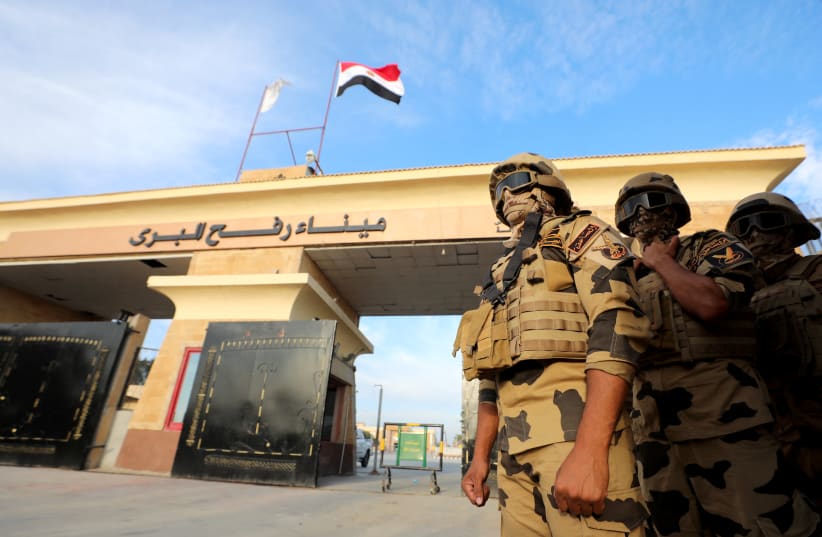PM Netanyahu refutes Reuters’ claim Israel intends to withdraw from Gaza-Egypt border
Israeli and Egyptian negotiators discuss an electronic surveillance system for Gaza’s border, aiming to allow Israeli troop withdrawal, crucial for ceasefire negotiations amid multiple obstacles.
By REUTERS, JERUSALEM POST STAFF JULY 12, 2024 11:33 Updated: JULY 12, 2024 22:52

Military personnel stand guard on the Rafah border crossing between Egypt and the Gaza Strip, October 31, 2023(photo credit: REUTERS/MOHAMED ABD EL GHANY)The Prime Minister intends to maintain its presence at the Philadelphi Corridor, the Prime Minister’s office posted on X, formerly Twitter, on Friday, following an exclusive report on Reuters claiming Israel is discussing the possibility of withdrawing from said area.
The Prime Minister insists that Israel remain on the Philadelphi Corridor. He has instructed the negotiating teams accordingly, made this clear to US representatives this week, and updated the Security Cabinet to this effect last night.
— Prime Minister of Israel (@IsraeliPM) July 12, 2024
Israeli and Egyptian ceasefire negotiators are allegedly in talks about an electronic surveillance system along the border between Gaza and Egypt that could allow Israel to pull back its troops from the area if a ceasefire is agreed, according to two Egyptian sources and a third source familiar with the matter.
The question of whether Israeli forces stay on the border is one of the issues blocking a potential ceasefire deal because both the Palestinian terrorist group Hamas and Egypt, a mediator in the talks, are opposed to Israel keeping its forces there.
According to Reuter’s report, Israel is worried that if its troops leave the border zone, referred to by Israel as the Philadelphi corridor, Hamas’ armed wing could smuggle in weapons and supplies from Egypt into Gaza via tunnels that would allow it to re-arm and threaten Israel again.
A surveillance system, if the parties to the negotiations agree on the details, could smooth the path to agreeing on a ceasefire – though numerous other stumbling blocks remain.
Discussions around a surveillance system on the border have been reported before, but Reuters is reporting for the first time that Israel is engaging in the discussions as part of the current round of talks, allegedly intending to pull back forces from the border area.

The source familiar with the matter, who spoke on condition of anonymity, said the discussions are about “basically sensors that would be built on the Egyptian side of the Philadelphi [corridor]. ”
High-tech surveillance proposal aims to secure Gaza border
“The idea is obviously to detect tunnels, to detect any other ways that they’d be trying to smuggle weapons or people into Gaza. Obviously, this would be a significant element in a hostage agreement.”
Asked if this would be significant for a ceasefire deal because it would mean Israeli soldiers would not have to be on the Philadelphi corridor, the source said: “Correct.”
The two Egyptian security sources, who also spoke on condition of anonymity, said Israeli negotiators had spoken about a high-tech surveillance system.
Egypt was not opposed to that, if it was supported and paid for by the United States, according to the two Egyptian sources. They said that Egypt would not agree to anything that would change border arrangements between Israel and Egypt set out in a prior peace treaty.
At a military event on Thursday, Israeli Prime Minister Benjamin Netanyahu said he could only agree to a deal that preserved Israeli control of the Gaza-Egypt border, but he did not spell out if that meant having troops physically present there.
Talks are underway in Qatar and Egypt on a deal, backed by Washington, that would allow a pause in the fighting in Gaza, ten months after the Palestinian terrorist group Hamas invaded Israeli borders, killing over 1,200 people, and the release of the remaining hostages held by the terrorist group.
Israeli officials have said during the war that Hamas used tunnels running under the border into Egypt’s Sinai region to smuggle arms. Egypt says it destroyed tunnel networks leading to Gaza years ago and created a buffer zone and border fortifications that prevent smuggling.
Israel’s advance into southern Gaza’s Rafah area in early May led to the closure of the Rafah crossing between Egypt and Gaza and a sharp reduction in the amount of international aid entering the Palestinian territory. Egypt says it wants aid deliveries to Gaza to resume, but that a Palestinian presence should be restored at the Rafah crossing for it to reopen.
Content retrieved from: https://www.jpost.com/israel-hamas-war/article-810066.